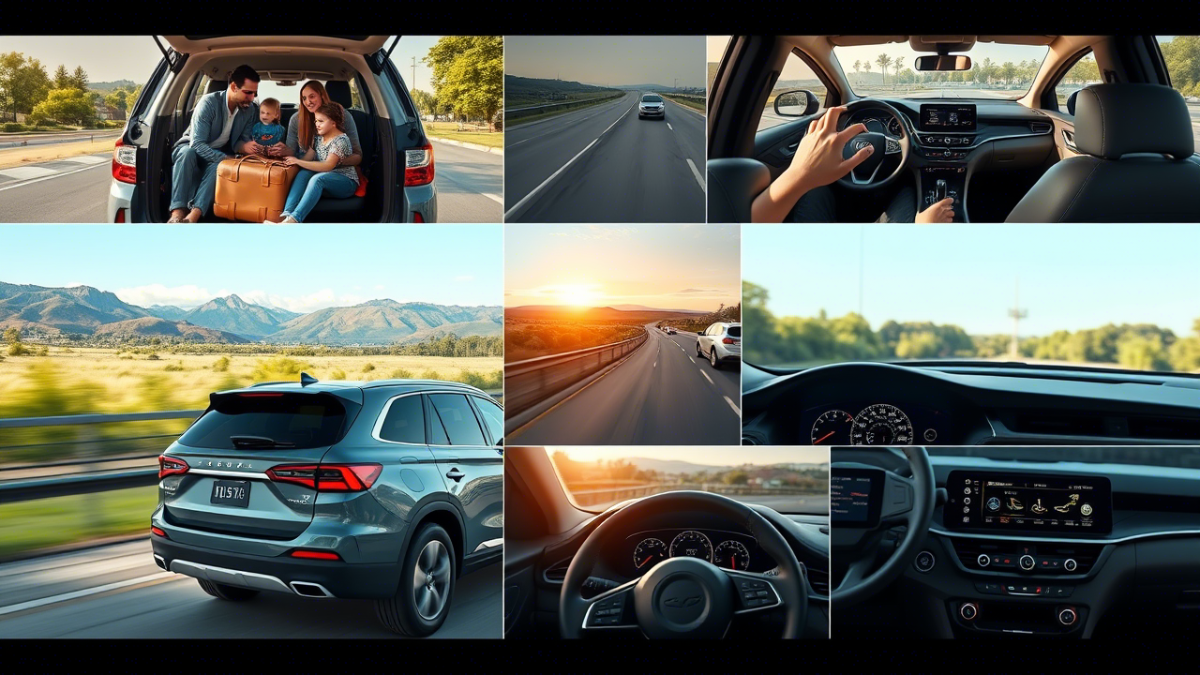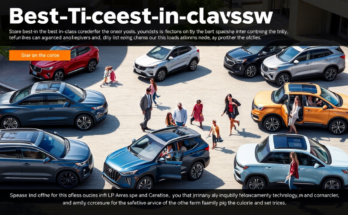Family SUVs have become a staple in the automotive market, catering to the needs of modern households that demand versatility, safety, and comfort. These vehicles are designed to balance practicality and performance, making them ideal for families who need a reliable mode of transportation for daily commutes, weekend getaways, and everything in between. Over the years, automakers have refined their offerings, introducing advanced features and innovative designs that make family SUVs more appealing than ever.
The growing popularity of these vehicles can be attributed to several factors. First and foremost is their spacious interiors, which provide ample room for both passengers and cargo. Whether it’s a road trip with luggage or a quick grocery run, family SUVs ensure that everyone and everything fits comfortably. Additionally, technological advancements have made these vehicles safer and more connected, offering features like adaptive cruise control, lane-keeping assistance, and built-in infotainment systems. Such innovations enhance convenience and provide peace to parents who prioritize safety.
Why Families Prefer SUVs Over Other Vehicle Types
When choosing a vehicle for family use, SUVs often outperform sedans, hatchbacks, and minivans. One primary reason is their commanding driving position. Sitting higher off the ground gives drivers better visibility, particularly useful in urban environments where navigating through traffic can be challenging. This elevated seating also makes it easier to spot potential hazards on the road, contributing to overall safety.
Another significant advantage is the all-wheel-drive capability found in many family SUVs. This feature proves invaluable during adverse weather conditions such as snow, rain, or icy roads. Unlike front-wheel-drive cars, SUVs with all-wheel drive distribute power to all four wheels, ensuring superior traction and stability. This can be a game-changer for families in regions prone to harsh winters or frequent rains.
Furthermore, family SUVs excel in terms of adaptability. With flexible seating configurations and foldable rear seats, they can transform from a people carrier to a cargo haulier within minutes. This versatility is unmatched by most other vehicle types, making SUVs a practical choice for families with varying needs.
Key Features That Define Modern Family SUVs
Modern family SUVs have various features to enhance convenience, safety, and entertainment. One standout feature is the panoramic sunroof, which adds a touch of luxury while providing natural light and ventilation. Many models now include dual-zone or tri-zone climate control systems, allowing each passenger to adjust their temperature settings—a must-have for long journeys.
Safety remains a top priority, and manufacturers have risen to the challenge by incorporating cutting-edge technologies. Blind-spot monitoring, rear cross-traffic alert, and automatic emergency braking are examples of automakers prioritizing occupant protection. Some high-end models even offer night vision cameras and 360-degree parking assistance, reducing the risk of accidents.
Entertainment systems have also evolved significantly. Rear-seat entertainment screens, wireless charging pads, and premium sound systems keep everyone entertained during lengthy drives. Connectivity options like Apple CarPlay and Android Auto ensure seamless integration with smartphones, enabling access to navigation apps, music streaming services, and hands-free calling.
Top Family SUV Models Worth Considering
With so many options, selecting the right family SUV can feel overwhelming. However, specific models consistently stand out due to their exceptional performance, reliability, and value for money. The Honda CR-V, for instance, has earned a reputation for its fuel efficiency, spacious interior, and user-friendly interface. Its hybrid variant offers impressive mileage without compromising power, making it an excellent choice for eco-conscious families.
Another popular option is the Toyota Highlander. Known for its durability and resale value, the Highlander boasts three rows of seating and can accommodate up to eight passengers. Its robust engine options and smooth ride quality make it suitable for both city driving and highway cruising. Meanwhile, the Hyundai Santa Fe combines affordability with premium features, including heated seats, a digital instrument cluster, and advanced driver-assistance technologies.
For those seeking a more luxurious experience, the Audi Q7 delivers unparalleled refinement. With its sleek design, powerful engines, and state-of-the-art infotainment system, the Q7 redefines what a family SUV can offer. On the other hand, the Kia Sorento appeals to budget-conscious buyers without skimping on essentials like safety and comfort.
Balancing Performance and Efficiency in Family SUVs
One common concern among prospective buyers is whether family SUVs sacrifice fuel efficiency for performance. While larger vehicles generally consume more fuel than compact cars, recent advancements in engineering have narrowed this gap considerably. Many manufacturers now offer hybrid and plug-in hybrid variants, allowing families to enjoy the benefits of an SUV without breaking the bank at the pump.
Take the Ford Explorer Hybrid, for example. It combines a turbocharged engine with an electric motor to deliver strong acceleration and excellent fuel economy. Similarly, the Mitsubishi Outlander PHEV operates primarily on electricity, switching to gasoline only when necessary. These models demonstrate that achieving efficiency is possible.
Some SUVs are equipped with robust V6 or V8 engines, which are ideal for those who frequently carry heavy loads. The Chevrolet Tahoe and GMC Yukon are prime examples, with towing capacities exceeding 8,000 pounds. Despite their size and strength, these vehicles maintain respectable fuel efficiency thanks to cylinder deactivation technology and aerodynamic enhancements.
Customization Options for Personalized Comfort
Every family is unique, and so are their preferences regarding vehicle customization. Automakers understand this and provide various options to tailor family SUVs to individual tastes. From exterior colours and wheel designs to interior trims and upholstery materials, there is no shortage of ways to personalize your ride.
Some brands go a step further by offering specialized packages. For instance, the Nissan Pathfinder Rock Creek Edition includes off-road tyres, underbody armour, and a raised suspension, making it perfect for adventurous families who love exploring rugged terrains. Conversely, the Volkswagen Atlas Cross Sport focuses on style and sophistication, featuring sporty accents and upgraded leather seats.
Technology enthusiasts will appreciate customizable dashboards and programmable settings. Specific models allow users to save personalized profiles for seat positions, mirror adjustments, and audio preferences, ensuring that every family member feels at home behind the wheel.
Maintenance Tips to ExtendYours Lifespan
Owning a family SUV comes with responsibilities, including regular maintenance to ensure longevity and optimal performance. Routine oil changes, tyre rotations, and brake inspections should never be overlooked. Neglecting these tasks can lead to costly repairs and compromise the vehicle’s reliability.
Attention to fluid levels, including coolant, transmission fluid, and windshield washer solution, is equally important. Keeping these topped up prevents overheating, ensures smooth gear shifts, and maintains clear visibility during inclement weather. Additionally, periodically replacing air filters improves engine efficiency and cabin air quality, benefiting both the vehicle and its occupants.
Families who frequently venture off-road should invest in protective measures such as skid plates and mud flaps. These accessories shield vital components from damage caused by rocks, debris, and dirt. Regularly cleaning the undercarriage after off-road excursions also helps prevent rust and corrosion.

FAQs About Family SUVs
What is the best family SUV for large families?
The Toyota Highlander and Chevrolet Traverse are excellent for large families due to their spacious interiors and three-row seating arrangements. Both models offer ample legroom and headroom, ensuring comfort for all passengers.
Are family SUVs expensive to maintain?
While maintenance costs vary depending on the model and brand, many family SUVs are designed for durability. Routine servicing and using genuine parts can help minimize expenses over time.
Can I use a family SUV for off-roading?
Certain family SUVs, such as the Subaru Outback and Jeep Grand Cherokee, have features suitable for light off-roading. However, extreme terrains may require specialized vehicles like the Land Rover Discovery or Toyota 4Runner.
How do I choose the right family SUV for my needs?
Consider seating capacity, cargo space, fuel efficiency, and available features. Test-driving multiple models and consulting expert reviews can also guide you toward the best decision.
Do family SUVs come with warranty coverage?
Most manufacturers provide comprehensive warranties covering defects and mechanical issues. Extended warranty plans are often available for additional peace of mind.



